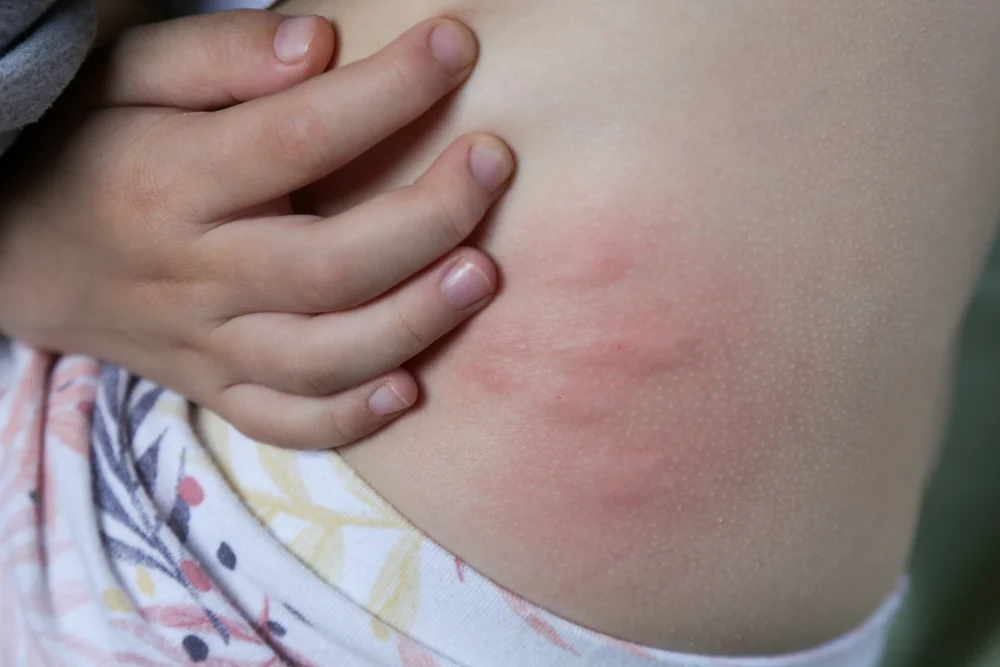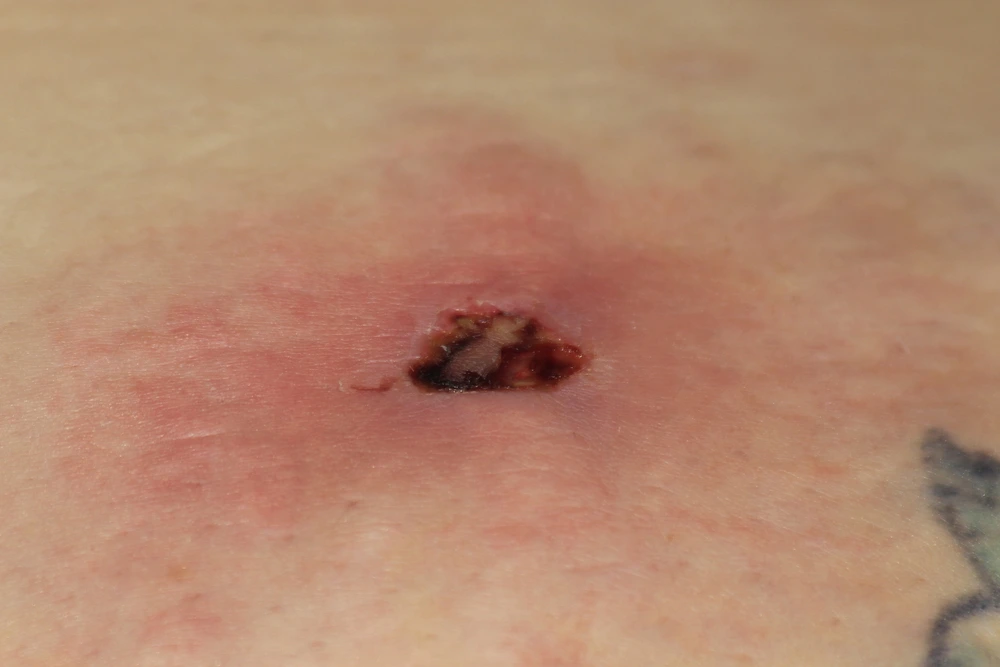A British man’s frightening experience has sparked a crucial warning about the dangers lurking in the most unexpected places—his own bed. After being bitten by a spider while sleeping, he was left battling necrotizing fasciitis, a rare and deadly flesh-eating disease. This unsettling incident highlights the potential risks of insect bites and underscores the importance of recognizing warning signs early. As he bravely shares his story, the man aims to raise awareness about the seriousness of such bites and the critical need for swift medical attention.
While spider bites are typically harmless, this case serves as a stark reminder that certain species can carry significant risks, especially when the bite is not treated properly. The man’s ordeal has prompted health experts to urge greater vigilance in identifying and responding to symptoms of infection, especially in areas where dangerous spiders may be present. His experience could save lives by encouraging others to take bite-related health concerns more seriously.

The Spider Bite Incident
The man, who wishes to remain anonymous, was initially unaware that he had been bitten by a spider while he slept in his bed on the Isles of Scilly, a group of islands off the coast of Cornwall. It wasn’t until the following morning that he noticed a small, unremarkable wound on his leg. At first, he thought it was just a minor scrape or insect bite, something he had experienced countless times before. However, within a matter of hours, the bite began to swell rapidly, becoming increasingly red and painful. The man initially tried to manage the discomfort with over-the-counter remedies, but the symptoms continued to worsen, causing him increasing concern. It wasn’t until the pain became unbearable and the swelling began to spread that he sought medical help.
By the time he arrived at the hospital, the wound had become severely inflamed, and the infection was spreading quickly across his leg. Doctors were alarmed by the severity of the situation and immediately diagnosed him with necrotizing fasciitis, a rare and often life-threatening condition caused by a bacterial infection that destroys soft tissue. The condition is commonly known as “flesh-eating disease” due to the rapid tissue death it causes. In this case, the infection had spread so quickly that it threatened to take his life. The doctors explained that, had he waited any longer to seek treatment, the infection could have been fatal. He was immediately taken into emergency surgery to remove the necrotic tissue and prevent the infection from spreading further.
The surgery, which involved removing large sections of tissue to halt the infection’s progress, was successful, but the man had to remain in intensive care for several days. His recovery was slow and painful, but he was eventually discharged from the hospital after undergoing multiple rounds of treatment. Despite his recovery, the experience has had a lasting impact on him. He remains shaken by the severity of the infection and the fact that a seemingly harmless spider bite could have almost cost him his life. Now, with his health restored, he feels compelled to share his story as a warning to others, urging people to take spider bites seriously and seek medical attention at the first signs of infection.
What is Necrotizing Fasciitis?
Necrotizing fasciitis, often referred to as “flesh-eating disease,” is a rare but extremely serious bacterial infection that spreads rapidly through the body, attacking soft tissue and muscles. The condition typically occurs when bacteria enter the body through a cut, scrape, or insect bite, causing severe damage to the tissue. The bacteria responsible for necrotizing fasciitis are usually a mix of aerobic and anaerobic organisms, including Group A Streptococcus, which can produce toxins that destroy tissue at an alarming rate.
The symptoms of necrotizing fasciitis often begin with localized redness, swelling, and pain around the infected area, which might initially resemble a minor wound infection. However, unlike common infections, the symptoms of necrotizing fasciitis escalate quickly. The affected area may become more intensely painful, swollen, and discolored. In some cases, blisters filled with dark or purplish fluid can form, and the skin may begin to die, turning black as the infection spreads. As the bacteria invade deeper layers of tissue, the infection can also cause fever, chills, and even shock, making it a medical emergency that requires immediate attention.
If left untreated, necrotizing fasciitis can lead to widespread tissue death, organ failure, and, in some cases, death. The condition progresses so quickly that it often requires urgent surgery to remove infected tissue, alongside antibiotics and other treatments. The survival rate depends largely on how soon the infection is diagnosed and treated, which is why experts emphasize the importance of prompt medical intervention. With timely treatment, patients can recover, but the process may involve a prolonged period of rehabilitation due to the extensive tissue damage that occurs.

The Spider’s Role: Was It a Dangerous Species?
The man’s experience with a spider bite raises an important question: which species of spider could have caused such a severe reaction? In the UK, the vast majority of spiders are not dangerous to humans, and bites from common species usually result in little more than mild irritation. However, in rare cases, certain spiders can inject venom that leads to more serious health issues, especially if the bite becomes infected or if the person has an allergic reaction.
The spider responsible for the bite in this case remains unidentified, though experts believe it may have been a species that is not typically aggressive toward humans but can still pose a risk if it feels threatened. While the UK does not have many venomous spider species, some, such as the false widow spider, have been known to cause painful bites that can sometimes lead to severe reactions. False widow spiders, although not deadly, have been associated with swelling, infection, and, in very rare cases, more serious complications. However, it’s crucial to note that fatalities from spider bites in the UK are exceptionally rare.
Experts emphasize that while these bites are often alarming, the real danger lies in how infections, such as necrotizing fasciitis, can take hold and spread. When bitten, the body’s immune system responds by sending white blood cells to fight off the bacteria, but in some cases, bacteria from the spider’s venom or the environment can complicate the healing process. It’s important to remember that a bite from even a non-venomous spider can become a serious health concern if proper care isn’t taken.
The Warning: Raising Awareness
In the wake of his terrifying experience, the man is using his ordeal to raise awareness about the potential dangers of spider bites and the importance of early medical intervention. His decision to share his story publicly is driven by a sense of responsibility to others, hoping to prevent anyone else from experiencing a similar health crisis. He is particularly concerned about the public’s general lack of awareness regarding the severity of infections that can result from seemingly harmless insect bites.
The man stresses that while most spider bites are not life-threatening, it is crucial to seek medical attention if a bite becomes inflamed, painful, or shows signs of infection. He emphasizes that early detection is key in preventing infections like necrotizing fasciitis from spiraling out of control. His advice echoes that of health professionals who urge people not to dismiss even minor bites, especially if they start to exhibit unusual symptoms.
Health experts agree with the man’s warning, pointing out that although serious reactions to spider bites are rare, they are not impossible. According to Dr. Sarah Johnson, an infectious disease specialist, “The key is to recognize early signs of infection and not wait too long for treatment. What seems like a minor bite can quickly escalate into a medical emergency, as was the case with this individual.” The man’s story has already prompted discussions about how the public can better prepare for potential spider bites and other insect-related health risks.
How to Prevent and Recognize Infections from Insect Bites
While it’s impossible to completely avoid insect bites, there are several steps people can take to reduce the risk of severe infections. First and foremost, wearing protective clothing, such as long sleeves and pants, when spending time in areas where spiders or other insects are prevalent, can help minimize exposure. If you’re camping or staying in an area known to have more dangerous species, using insect repellents and taking precautions before settling into bed is also advisable.
If you are bitten, it’s important to clean the area immediately with soap and water, as this helps remove bacteria that could cause infection. Applying an antiseptic ointment can further reduce the risk of bacteria entering the wound. Keeping the bite site clean and monitoring it for signs of infection is crucial. If the bite begins to swell excessively, become increasingly painful, or shows other signs of infection such as pus or fever, it’s vital to seek medical attention right away. Early treatment with antibiotics can prevent infections from worsening into more severe conditions like necrotizing fasciitis.
Health experts also recommend being cautious of bites that seem to worsen over time, as the bacteria from an insect bite can sometimes lead to complications. It’s important to recognize that necrotizing fasciitis doesn’t always present immediately, and its symptoms may initially appear like a typical wound infection. However, as the infection spreads, the pain may increase significantly, and the area can turn discolored or show signs of tissue death. If you experience any of these symptoms, prompt medical care is critical.
Key Takeaways
The man’s harrowing experience with a spider bite and subsequent necrotizing fasciitis serves as a sobering reminder of the unpredictable dangers that can arise from seemingly minor injuries. While the vast majority of insect bites are harmless, the severity of this case highlights the critical importance of taking any bite or wound seriously, especially if it shows signs of infection. His story underscores the need for early intervention, as the rapid progression of conditions like necrotizing fasciitis can be life-threatening if left untreated.
By sharing his experience, the man hopes to raise awareness about the potential risks of spider bites, particularly in areas where dangerous species may be present, and to encourage others to act quickly if they notice any unusual symptoms following a bite. Health professionals echo this sentiment, advising that all insect bites, no matter how minor they may seem, should be monitored carefully. In the case of infection, seeking medical help without delay can make all the difference in ensuring a full recovery.
Ultimately, while the odds of encountering a serious reaction to a spider bite are low, this man’s experience is a powerful reminder of the importance of vigilance and timely medical care. With increased awareness and proper precautions, individuals can minimize their risk and ensure that they are prepared to handle any potential bite-related health concerns.
Sources:
Elston, D. M., Miller, S. D., Young, R. J., Eggers, J., McGlasson, D., Schmidt, W. H., & Bush, A. (2005). Comparison of colchicine, dapsone, triamcinolone, and diphenhydramine therapy for the treatment of brown recluse spider envenomation. Archives of Dermatology, 141(5). https://doi.org/10.1001/archderm.141.5.595
Olsen, R. J., Burns, K. M., Chen, L., Kreiswirth, B. N., & Musser, J. M. (2008). Severe Necrotizing Fasciitis in a Human Immunodeficiency Virus-Positive Patient Caused by Methicillin-Resistant Staphylococcus aureus. Journal of Clinical Microbiology, 46(3), 1144–1147. https://doi.org/10.1128/jcm.02029-07



